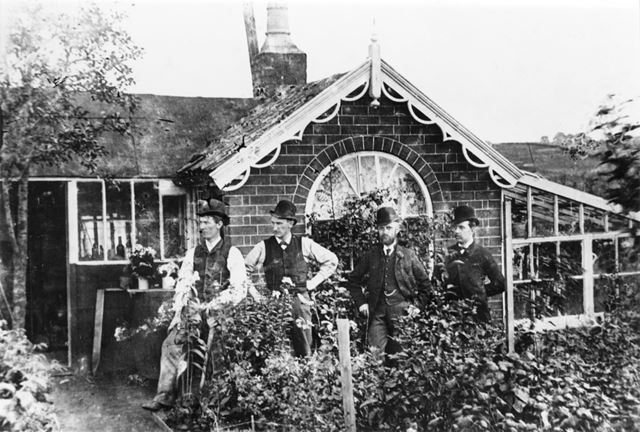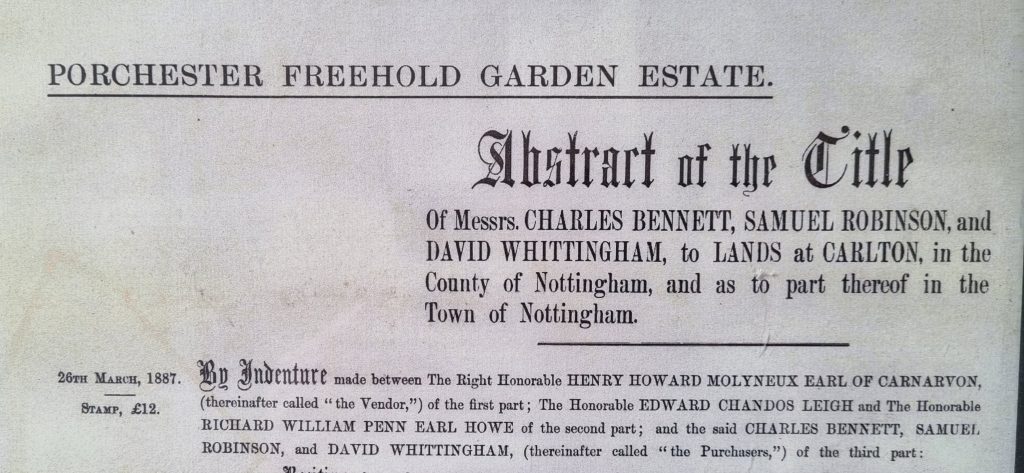Whittingham Road in the Porchester Gardens area of Mapperley takes its name from David Whittingham, one of the founders of the Garden Estates that were created for local people in the 1900s.
On his death in 1918, his obituary included the words:
It is no exaggeration to say that he personally did more than any other citizen to provide garden plots for working men, the Porchester Estate, Carlton Hill, Sneinton and several other groups of gardens owe their existence as allotments largely to his efforts.
Whittingham was born in 1850 at Nantwich in Cheshire. He moved to Nottingham to finish his training as a solicitor, initially lodging at a house in Sherwood.

He joined in the practice of his uncle, a solicitor named David Heath. Heath was the Nottingham District Coroner at the time and also involved in local politics at the Arnold Urban District Council.
Whittingham completed his training and qualified as a solicitor in 1877. He soon gained a good reputation on both sides of the court as both prosecutor and defence. He was also appointed as the deputy coroner to his uncle.
He married David Heath’s daughter, Mary Boyd in the same year. They had two children, daughter Mary and son David who was born in 1880.
In 1880 his uncle David Heath died and an election as a replacement for the cornier was held in October of that year. There were two candidates David Whittingham (proposed by W Tipmas JP) and Mr G T Travell (proposed by Mr Kirkland).
At the meeting both candidates addressed the assembled crowd. At the end of which the under-sheriff asked for a vote by ‘show of hands’. Mr Travell was declared the winner, however a full poll by ballot was demanded by Mr Tidmas. This was granted and on 29th of October, Mr Whittingham was elected the winner. The results were 1320 votes to 1276 for Travell.
Whittingham then duly served as Nottingham District Coroner from 1880 until his death in 1918.
His offices were at 7 Middle Pavement in Nottingham.
He lived at 395 Mansfield Road in Carrington, Nottingham with his wife and family.
Family Tragedy
In March 1893, his thirteen year old son David, was returning home from school. Whilst attempting to board a tram his foot slipped on the step. He fell in front of a wheel which unfortunately passed over his right leg. He was returned to his home in Carrington and three doctors were called (Messrs Burnie, Anderson and Williams). After a consultation between themselves they decided that the only course of action was the amputation of the badly damaged limb. The child was removed to hospital where the operation was carried out. He fortunately survived the experience and recovered. David Whittingham jnr also went on to become a solicitor, practising in Nottingham.
Successful Career
Despite this tragedy David Whittingham snr continued as coroner and was well regarded and considered fair-minded. One of Nottingham’s most liked and longest running men in this post he oversaw many other tragic cases, other than his own, in the following years.
in 1887, he joined Charles Bennett and Samuel Robinson to purchase the freehold of land that became the Porchester Garden Estate.
Many of the roads in Porchester Gardens are connected to the original committee members. Samuel Robinson, brother of Sir John Robinson, founder of Home Breweries, was president. His nephew, John Sandford Robinson, an England cricketer, died aged 30, after he fell from a horse. David Whittingham, a solicitor, drew up the legal documents. George Bennett rose from humble beginnings in the brickmaking industry to become an alderman and local magistrate. J.H. Haywood was the treasurer. He was immortalised as ‘Mr Jordan’ in the D.H. Lawrence novel ‘Sons and Lovers’, a short “red-faced, white-whiskered old man” who reminded the novel’s hero “of a Pomeranian dog”.
Thanks to the Haywood Road Community Centre website for the above information.

Calverton Tragedy
Here’s a case that Coroner David Whittingham dealt with in 1899.
An inquest was held on Tuesday afternoon at the White Lion Inn, Calverton, before Mr D. Whittingham (District Coroner) upon the body of Samuel Turton, aged 55, farm labourer, who was found hanging in a pigsty near his house on Monday morning. James Turton, son of the deceased, said he lived with his father, who until eight weeks ago was employed by Mr Richardson, of Oxton. Since then he had been doing odd jobs. On Monday morning the witness was called up by his mother soon after five o’clock, and he went to the pigsty, and there found his father hanging from a beam. He called in the assistance of a couple of neighbours, and they cut him down. He was dead, and they discovered that he had cut his throat across the right side with the carving knife produced. Witness had not seen his father since dinner time on Sunday. When he (deceased) went to bed early. Deceased had been ill, and had been attended by Dr Simpson. Deceased was, however, able to get out last week, and he believed he got some beer, and owing to having been out of work he had got in a low way. Witness’s mother was not able to attend owing to illness. Mary Jebb, a widow, living opposite to the deceased, corroborated the statement that he had recently been depressed, owing, she believed, to his being out of work. After the Coroner had briefly summed up, the jury had no hesitation in finding that the deceased committed suicide while of unsound mind.
Thanks to the Calverton Village website for the details https://www.calvertonvillage.com/deaths
Also many thanks to historian Bob Massey for much of this information.
To find out more the work of Bob Massey, go to http://www.bobmassey.info/415183060
